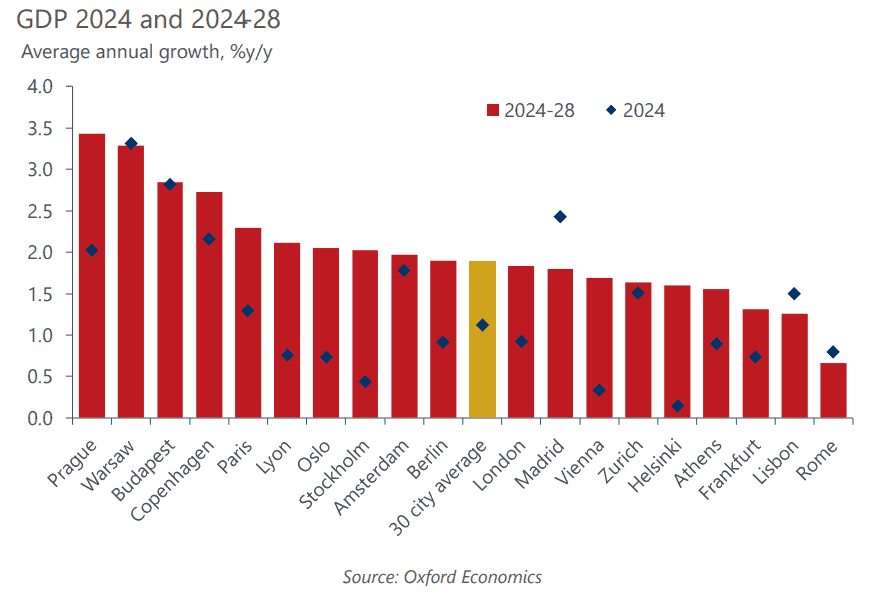Where to Invest in Property
Property Investment Landscape: Prime Locations and Effective Strategies
The stock market, with its unpredictable fluctuations, is a rollercoaster. In contrast, property investment is a tranquil boat ride, particularly in the UK. It is often seen as a safe harbour, offering security and the potential for passive income through rental opportunities. But the question remains: where should you drop your anchor, and what strategies should you employ?
Buy UK Property from Abroad
International Investment Services
Low Fixed Fees
Transparent pricing with no hidden costs, making your investment budget predictable from the start
Nationwide Property Sourcing
Access to investment opportunities across the UK, from London to Edinburgh
Property Viewings & Due Diligence
Professional inspection services and thorough property checks to protect your investment
Expert Negotiation
Skilled negotiators working to secure the best possible price and terms on your behalf
Full Investor Representation
Your dedicated UK representative handling all communications and legal matters throughout the transaction
Letting/Management
Sit back and relax while we manage your property, find quality tenants, and maximise your rental income
There are two main paths in property investment:
Direct Investment: Purchasing a residential or commercial property. This route offers more control over the property.
Indirect Investment: Investing via property investment funds. This option provides diversification and reduces management responsibilities.
When contemplating investing in property, consider these key factors:
Economic Growth: The area’s economic development can impact property value.
Infrastructure Condition: Quality infrastructure can enhance property appeal.
Rental Demand: High demand can lead to better rental income.
Local Amenities: Proximity to amenities can increase property desirability.
Diversification: Spreading investments across various property types and locations can distribute risk and potentially boost returns.
In this piece, we’ll explore prime UK cities that are fertile grounds for property investment, uncover emerging hotspots, and discuss alternative investment strategies. We’ll also touch on crucial considerations to remember and how to grow your property portfolio effectively. Whether you’re a expirienced investor or a newbie, understanding these elements can help you make informed decisions and maximize your investment potential.
Top Cities in the UK for Real Estate Investment
Considering investing in the UK’s property market? Several cities consistently emerge as top contenders, not only for their vibrant atmospheres and rich histories but also for their strong economies and attractive rental yields. If you’re pondering where to allocate your investment funds, here are some of the prime cities to consider:
Birmingham: Known for its ongoing urban renewal projects and robust economy, Birmingham offers appealing rental returns, making it a strong alternative to London for property investors.
Manchester: With a thriving economy and significant potential for capital appreciation, Manchester attracts real estate investors. Its strong rental demand and infrastructure development enhance its investment appeal.
Edinburgh: Celebrated for its cultural richness and impressive rental returns, Edinburgh’s economy, driven by the finance and tech sectors, ensures steady growth in the property market.
Leeds: As a major economic hub, Leeds promises strong rental income and potential for capital appreciation. Urban renewal projects, such as South Bank Leeds, further enhance its investment allure.
Liverpool: Renowned for its cultural heritage and affordability, Liverpool offers a unique combination of high rental returns and growth potential.
Glasgow: With its economic vitality and ongoing development, Glasgow is a promising destination for property investors seeking high returns.
Sheffield and Nottingham: These rising stars in the investment landscape are gaining attention due to their urban renewal projects and attractive rental returns.
Each of these cities presents unique opportunities and challenges, but they all share one common trait: the potential for rewarding returns on real estate investments. Whether aiming for high rental income or capital appreciation, these cities offer a fertile ground for your investment journey.
The Next Big Thing: Up-and-Coming Investment Destinations
Are you searching for the next big opportunity in the UK property market? Consider the up-and-coming investment destinations that are gaining attention among savvy investors. Cities like Derby, Bradford, and Hull are undergoing significant rejuvenation, making them attractive for those seeking affordable property prices. These areas not only offer low entry costs but also hold a promising outlook for future growth.
Meanwhile, Middlesbrough and Durham are capturing interest with their high rental yields and potential for capital appreciation. Their strategic locations and ongoing development initiatives are increasing their popularity. Investing in these cities could be wise for those looking to maximize returns while entering the market at a more affordable price point.
Liverpool: A Blend of Cultural Richness and Affordability
Liverpool is renowned for its rich cultural heritage and vibrant music scene, making it a treasure trove for property investors. With an average property price of £198,505, Liverpool offers a mix of affordability and impressive annual rental growth of 8.9%, along with a rental yield of 4.29%. Developments in areas like the Baltic Triangle and Knowledge Quarter are boosting the city’s property market, making it a hotspot for those seeking high rental yields and potential capital growth.
Moreover, Liverpool’s ongoing economic resurgence adds another layer of appeal, promising not just cultural richness but also financial rewards. It’s no surprise that investors are drawn to this city, enticed by the potential for a profitable return on investment.
Sheffield: A Mix of Affordable Prices and Robust Yields
Sheffield is making waves in the property investment landscape. With an average property price of £241,354, Sheffield offers an enticing blend of affordability and high rental yields at 5.57%. The city’s annual rental growth of 11.3% is noteworthy, making it an attractive proposition for investors.
Sheffield’s property market benefits from ongoing redevelopment initiatives and strong demand for rental properties. This combination makes it a prime location for those looking to invest in a city with immediate and long-term potential. Sheffield might be the ideal choice if you’re considering expanding your property portfolio.
Glasgow: A Fusion of Economic Dynamism and Development
Don’t overlook Glasgow when considering your next property investment. This city is emerging as a gem thanks to its robust rental demand and economic dynamism. With an average property price of £174,000, Glasgow offers an attractive entry point for investors, with an annual rental growth of 8.18% and a rental yield of 6.56%.
Glasgow’s property market is strengthened by developments in the West End and a thriving cultural scene, promising financial and lifestyle benefits. Glasgow is worth a closer look for those looking to invest in a city with a dynamic economy and ongoing development.
Nottingham: A Blend of Regeneration and High Yields
Finally, consider Nottingham, known for its diverse economic landscape and steady job market. With an average property price of £192,000, Nottingham offers high rental yields of 5.71% and an annual rental growth of 5.71%.
Nottingham’s property market is supported by developments like the Southside regeneration project and a large student population, making it a promising location for investors. The city’s ongoing regeneration efforts and high rental yields make it a compelling choice for those looking to invest in a city with immediate returns and long-term growth potential.
Alternative Property Investment Strategies
In the expansive world of property investment, alternative strategies offer diverse opportunities for those willing to explore beyond traditional methods. These strategies, including buy-to-let, property development, property funds, and REITs, cater to various investor needs and risk profiles, each providing unique income generation and capital growth avenues.
Are you considering investing in overseas property? This option can be enticing, with the potential for lucrative rental income and capital appreciation. However, success in foreign markets requires a thorough understanding of local laws, market conditions, and potential risks. For those ready to take the plunge, the rewards can be substantial.
Pooling Resources with Property Investment Funds
Property investment funds offer an ideal solution for investors who prefer a hands-off approach. These funds allow individuals to pool their resources, granting access to a diversified property portfolio without the complexities of direct management. This strategy opens up potential returns and mitigates risk by spreading it across various assets.
Another option is real estate investment trusts (REITs), companies that invest in properties and offer tradable shares on the stock market. Investing in REITs allows you to benefit from rental income and potential capital growth without directly owning or managing real estate. Additionally, REITs provide liquidity and possible tax advantages, making them popular among investors.
Buy-to-Let: A Classic Route to Rental Income and Growth
The buy-to-let investment strategy remains reliable for generating rental income and achieving capital growth. This approach involves purchasing residential properties to rent out to tenants. With high demand for rental properties, buy-to-let offers the potential for a steady income stream and long-term appreciation.
While buy-to-let focuses on leasing, property development shares a similar goal of capitalizing on rental income and property value increases. However, property development involves purchasing, renovating, and selling properties for profit, offering a different path to financial gain.
Property Development: The Art of Renovation and Resale
Property Development involves purchasing properties to refurbish or renovate and then selling them for a profit. This strategy can be highly rewarding but comes with its own set of risks. Successful property development requires careful planning, market insight, and a thorough understanding of costs.
While potentially lucrative, property development demands a proactive approach and a willingness to navigate the complexities of the real estate market. It offers a dynamic and profitable investment path for those with the right skills and knowledge.
The ABCs of Property Investment: What You Need to Know
Thinking about diving into property investment? It’s more than just picking a charming house and hoping for the best. Here are some key factors to consider to ensure your investment is successful:
Economic Health: Invest in areas with a thriving economy, which often leads to a stable property market.
Local Market Conditions: Analyze whether properties are selling quickly or lingering on the market. This insight helps assess potential rental yield and capital growth.
Rental Yield: Focus on properties in high-demand areas and manage costs to maximize yearly rental income as a percentage of the property’s value.
Political Stability and Legal Factors: Stay informed about political and legal changes that could impact your investment.
Rental Yield: The Secret to Boosting Returns
Rental yield is a crucial term in property investment, representing the annual rental income as a percentage of the property’s value. To enhance rental yield:
Choose properties in high-demand areas, such as bustling city centres or up-and-coming neighbourhoods.
Manage costs effectively by keeping maintenance expenses low and ensuring the property is well-maintained to attract premium tenants.
Capital Growth: The Path to Long-Term Value Appreciation
Capital growth refers to increased property value over time, offering long-term returns. To capitalize on this:
Invest in areas with strong economic growth and development potential, where property values are likely to rise.
Consider entering the market early to maximise future gains before it becomes widely recognized.
Economic and Political Stability: The Pillars of Security
Economic and political stability are essential for a secure market in property investment. A stable economy supports a steady property market, while political stability prevents sudden changes that could affect your investment. To safeguard your investment:
Stay updated on potential legal changes and economic trends impacting property values.
Be proactive in monitoring shifts that might influence the market.
Local Market Conditions: Decoding the Supply and Demand Puzzle
Understanding local market conditions is vital for informed investment decisions. Consider the following:
Evaluate the balance of supply and demand in the area. A high demand with limited supply indicates strong rental income potential.
Research local housing markets, rental demand, and economic factors to identify promising investment opportunities.
Overseas Property Investment
Have you ever considered investing in property abroad? It’s an exciting journey that offers the potential for diversification and promising returns. However, like all investments, it comes with its challenges. Before diving in, it’s crucial to understand the landscape. Investing overseas isn’t just about acquiring a beautiful seaside villa; it’s about navigating foreign markets, understanding legal requirements, and assessing economic conditions.
Why should you consider property abroad? Here are some compelling reasons:
Diversification: Investing in different countries helps mitigate risks associated with local market volatility.
Higher Returns: Some foreign markets may offer higher rental yields or better capital growth opportunities than your home country.
However, it’s essential to approach this with a clear understanding of the complexities involved. Comprehensive research is necessary. Be aware of legal aspects, such as property ownership laws and tax implications. Economic conditions in the target country, including inflation rates and currency stability, can also impact your investment.
Opportunities and Risks in Foreign Markets
Exploring foreign markets for property investment can be both rewarding and risky. On the positive side, there are enticing opportunities like high rental yields and potential capital growth. Imagine owning a property in a bustling city with high rental demand or in a picturesque location rapidly increasing in value.
However, it’s important to acknowledge the risks. Currency fluctuations can erode your returns, and legal challenges may arise if you’re unfamiliar with local regulations. This is why thorough research is crucial. Investigate market trends, understand the economic climate, and seek professional advice. A local real estate expert can provide invaluable insights and help you navigate the complexities of international property investment.

International Property Investment
What are the most effective strategies for investing in property globally? Here are some key steps:
Research: Thoroughly understand local markets, including legal requirements such as property ownership laws and tax obligations.
Manage Currency Risks: Exchange rate fluctuations can significantly impact returns. Diversify your portfolio by investing in properties across different countries to reduce dependency on a single market’s economic conditions.
Diversification: This isn’t just about risk management; it’s about capitalizing on global opportunities. Owning properties in various locations can help you access different growth potentials and rental yields.



